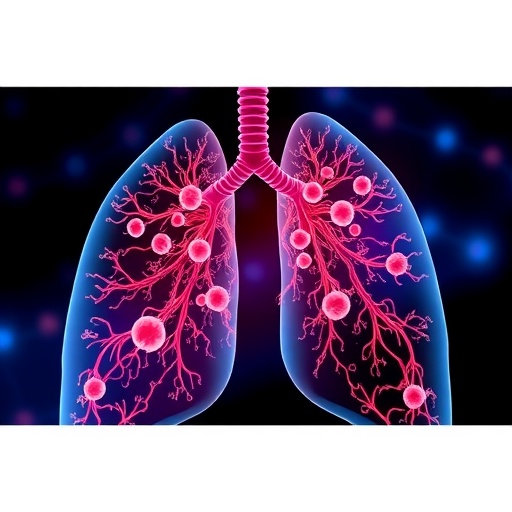In a landmark development unveiled at the International Association for the Study of Lung Cancer 2025 World Conference on Lung Cancer (WCLC) held in Barcelona, researchers have identified interferon-induced transmembrane protein 3 (IFITM3) as a vital modulator influencing the sensitivity of small cell lung cancer (SCLC) to immunotherapy. This discovery provides a promising pathway to overcoming the resistance posed by PD-1/PD-L1 checkpoint inhibitors, which have revolutionized cancer treatment yet remain ineffective in a significant subset of SCLC patients.
Small cell lung cancer, accounting for approximately 15% of all lung cancers, is notorious for its aggressive nature and poor prognosis. One of the underlying causes of its refractory response to immunotherapy is the notably low expression of major histocompatibility complex class I (MHC-I) molecules, essential for immune cells to recognize and attack tumor cells. This immune evasion mechanism significantly hampers the efficacy of checkpoint blockade therapies, which rely on reinvigorating the patient’s cytotoxic T lymphocytes.
The collaborative research team from Shanghai Pulmonary Hospital and the University of Pittsburgh has provided compelling evidence that IFITM3 enhances the immunogenic footprint of SCLC tumors by upregulating MHC-I expression. Mechanistically, IFITM3 achieves this by activating NLRC5, a master transcriptional activator of MHC-I genes, and facilitating its translocation into the nucleus where it initiates transcription. This molecular cascade not only restores antigen presentation capabilities but also fosters an environment conducive to infiltration by CD8⁺ T cells, pivotal players in anti-tumor immunity.
Dr. Xinyu Liu of Shanghai Pulmonary Hospital, lead investigator on the project, emphasized the dual potential of IFITM3 as both a biomarker and a novel therapeutic target. According to Dr. Liu, IFITM3’s expression levels correlate strongly with MHC-I presence across multiple patient cohorts, and higher IFITM3 is predictive of better clinical outcomes in individuals receiving chemoimmunotherapy regimens. This finding holds immense clinical significance, as it may help stratify patients who are more likely to benefit from immunotherapeutic approaches.
This elucidation of IFITM3’s role also extends to therapeutic innovation. The team has identified a small molecule, ethyl gallate (EG), capable of pharmacologically inducing IFITM3 expression in preclinical SCLC models. Treatment with EG significantly sensitized tumors to PD-1 blockade, overcoming primary resistance and leading to more robust tumor regression. This advancement suggests that combining IFITM3 inducers with existing checkpoint inhibitors could enhance therapeutic efficacy and potentially transform the management paradigm for SCLC.
The mechanism by which IFITM3 primes tumor cells involves upregulation of antigen presentation machinery, including not only MHC-I molecules but also components of the antigen processing pathway. By amplifying the tumor’s visibility to the immune system, the tumor microenvironment sees an influx of activated CD8⁺ cytotoxic T lymphocytes. These cells are critical for orchestrating effective tumor cell destruction, and their increased presence correlates with improved survival metrics.
Immunotherapy resistance remains a monumental barrier in improving outcomes for SCLC patients. Unlike non-small cell lung cancers, where immunotherapies have become standard of care with significant response rates, SCLC has lagged behind, partly due to a paucity of actionable biomarkers and a suppressive immune milieu. The discovery of IFITM3’s regulatory capacity in reinstating immunogenicity offers a beacon of hope, signaling a new class of intervention targets to sensitize previously unresponsive tumors.
From a translational perspective, leveraging IFITM3 as a predictive biomarker could revolutionize patient treatment selection, enabling precision immunotherapy tailored to the molecular immunogenic profile of individual tumors. Furthermore, pharmacologically targeting this pathway through small molecules such as ethyl gallate provides a feasible and potentially low-toxicity adjunct to current immunotherapy protocols.
The implications of this research stretch beyond SCLC alone, opening investigational avenues into other tumors with impaired antigen presentation and immune evasion mechanisms. The intricate interplay between IFITM3, NLRC5, and MHC-I emphasizes the importance of restoring functional antigen presentation as a cornerstone of effective immunotherapy response. It also underscores the nuanced regulatory networks controlling tumor immunogenicity that are ripe for therapeutic exploitation.
In conclusion, this pioneering study presented at WCLC 2025 delineates IFITM3 as a critical gatekeeper of immune sensitivity in SCLC through its enhancement of antigen presentation and recruitment of cytotoxic T cells. The translational potential of inducing IFITM3 expression pharmacologically illustrates a promising strategy to surmount immunotherapy resistance, potentially improving survival outcomes for one of the deadliest forms of lung cancer.
Future clinical trials are warranted to validate IFITM3 as a biomarker for patient stratification and to evaluate the safety and efficacy of IFITM3 inducers like ethyl gallate in combination with PD-1/PD-L1 checkpoint blockade. Success in these endeavors could herald a paradigm shift in the therapeutic landscape of SCLC, providing clinicians with new tools to combat this aggressive malignancy and ultimately enhance patient quality of life and longevity.
Subject of Research: Interferon-induced transmembrane protein 3 (IFITM3) as a regulator of immunotherapy sensitivity in small cell lung cancer (SCLC).
Article Title: IFITM3 Identified as Key Modulator of Immunotherapy Response in Small Cell Lung Cancer
News Publication Date: September 9, 2025
Web References: www.iaslc.org
Keywords: Small cell lung cancer, IFITM3, immunotherapy, PD-1/PD-L1 checkpoint blockade, MHC-I, antigen presentation, NLRC5, ethyl gallate, chemoimmunotherapy, CD8⁺ T cells, tumor immunogenicity, immune resistance




